#Disc practitioner
Explore tagged Tumblr posts
Text
Get theBest DiSC Certification Training Online
Discover the power of DiSC training with WeFacilitate-DiSC. Their expert facilitators offer dynamic and engaging workshops designed to enhance communication, collaboration, and team performance.
#Disc Certification Training#Disc Facilitator Certification#Disc Trainer Certification#Certified Disc Trainer#Disc practitioner#Disc Training Online#Disc Facilitator Training#Best Disc Certification#Disc Profile Certification#Online Disc Certification#Disc Coaching Certification#Disc Certified Trainer#Certified Disc Facilitator#Wiley Disc Certification#Wiley Everything Disc#Disc Trainer
0 notes
Text
Habitude
Seeking help from a business and workplace coach? Look no further than Rod Francisco of Habitude. He is an experienced business and human resources executive leader and coach, with qualifications in business management, workplace coaching, international politics, strategy, business, human resources, and industrial relations. He has a well-developed communication style and extensive leadership experience. Reach out and connect with him today!
#Behaviour#business coach#Habitude#Human Resources#Leadership Coach#Rod Francisco#thecoachingdirectory#coaching#coaching solution#coaching services#business coaching#Practitioner of Extended DISC#disc
0 notes
Text
hey s/o to chronically ill or otherwise physically disabled people who are mostly, entirely undiagnosed, or otherwise have undiagnosed body problems that have yet to be explained.
especially if your symptoms are scary and confusing and weird enough to both you (and perhaps also to medical practitioners) that you have no idea what's really going on with you so that you can't even self-dx or make a solid guess at it.
especially if you keep getting expensive and non-routine medical testing/exams that seems like it's supposed to tell you something but then the results come back normal.
especially if the only potential answers to your problems are notoriously difficult to diagnose, treat, and/or require specialists that you don't have access to.
especially if this would have been a lot easier to deal with if you had supportive family members but you were medically neglected and/or don't have any family that you can rely on (this particularly applies to congenital stuff.)
and especially if you don't have the time, finances, or patience to figure out what the fuck is going on because dealing with the medical system and constant testing and a constant lack of answers is utterly fucking exhausting. desperately wanting help and relief and feeling fear that something might be seriously wrong but you don't even need to start, or just being tired of suffering and not having any clue what your body is doing.
post inspired having had episodes of wack neurological(?) shit that was causing excruciating nerve pain at the base of my neck and my upper back that was at like a 10 and cognitive impairment that got worse the longer i remained upright (including my speech starting to slur) over the past couple of years that seems to correlate with daytime manual labor specifically. seemed to be a herniated disc but a supine mri that insurance refused to cover showed zero signs of disc herniation or any other abnormalities. is it cci? is it a spinal cfs leak?? who fucking knows dude!! i came home sounding like i was drunk one day due to how fucking delirious i was and left work on day in tears once due to feeling like a knife was in the base of my neck and i still have no idea why ✌🏻
#chronic illness#chronically ill#physical disability#physically disabled#cripple punk#< - not super related i just want this to be seen#j#body log
536 notes
·
View notes
Note
Hi there, love your DBZ analyses! It’s a lot of fun reading them, and you’ve made really good observations that I try to incorporate into my fics!
One thing I wanted to ask is if you think the humans might have been able to maintain a…stronger? Roll in the Android/Cell saga fights if they were allowed to seek out Goku to learn some of his techniques. Such as the Kaioken, which could theoretically give a bigger multiplier than Super Saiyan. Or the Spirit Bomb, a move we know Krillin is capable of using (at least, capable of using in a diminished form).
I just ask because I like to think of ways I could have the humans stay relevant in fights when writing fics. At least, whenever they haven’t made the decision to retire like Krillin and Yamcha have. (And no shade there, if they don’t want to be practitioners anymore that’s 100% valid.)
To the contrary, I think if the humans remained relevant, we'd see them devising new techniques and skills of their own distinct from the Kaio-ken and Genki-Dama. Possibly incorporating some of their ideas, but using their time on Kaio's world and beyond to develop their own unique styles.
That's always been how they operate. They're all innovators. They'll follow the trails Goku blazed in terms of training under the same masters, but they also spend a lot of time separately working on their unique arts. They create new techniques like the Sokidan/Spirit Ball or Shishin no Ken/Multiform or Kienzan/Destructo Disc, awaiting the day they'll show off what they've made to one another at the tournament. Even Piccolo falls into that rhythm after his defeat.
Ten even says as much when we briefly check in on him.

But because the human martial artists fell out of focus, we never get to find out what he means by this.
54 notes
·
View notes
Text
The Swords
So I was watching, as you do, some videos by some very charming and passionate martials arts practitioners comparing and contrasting various designs of sword and their usage. And I remembered that I had vaguely, perhaps subconsciously, noticed something strange about the magical swords used in this show.
The first one we see is the Hellfire sword which Dongfang Qingcang materialises as he calls Shangque.

It's straight, with no curve to the blade at all, and both edges appear to be sharp. It's basically cross-shaped, with a large, decorated cross-guard extending parallel with both edges. And it has a fairly large roundish pommel, by which he holds it:

I think I semi-consciously noticed that this looks a lot more like a European longsword, except that it's not all that long. Chinese swords are usually curved, even if only slightly, are usually sharp on one side only, and usually have disc-shaped handguards. [Edit! see reblogs for information on jians, which are straight and double-edged but with tiny crossguards] They sometimes have pommels, but the kind you see in the Wuxia genre generally doesn't.
So I thought, is this one of the subtler ways in which they're setting out to make Dongfang Qingcang and the Moon Tribe seem a little bit foreign and therefore barbarous, "not-Han-coded", as someone on Discord put it?
But then I checked the other swords, and that's not it.
Changheng's is a bit ambiguous. It has a pronounced cross-guard, less elaborate but more fantastical - it seems to be thinking about morphing into a 16th-century European basket hilt, as that downturned curve wouldn't work to catch your opponent's blade, but it isn't quite there yet:

The blade also looks very straight, and we don't see the prop without the CGI for long enough to tell whether it's meant to be sharp on both edges. It might be more of a sabre, a design that pops up in martial arts traditions everywhere.
The third sword we see is Lady Chidi's battle sword, which is the same basic design as Dongfang Qingcang's:

As you can see in the closeup, it's cross-shaped, double-edged, straight, and symmetrical, with a pronounced pommel, a long hilt for two hands, and a large cross-guard parallel to the edges.
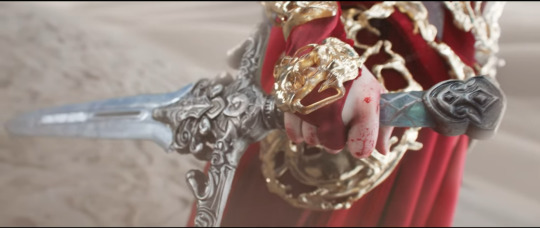
This shape is important, because scale is an optional setting for powerful immortal beings, and she will soon turn it into this mountain, with the cross-guard becoming a very convenient platform for conversation and sunbathing:

The other plot-relevant sword, in Episode 31, is the same cross-shape, with a really big cross-guard and a fairly pronounced pommel.

However! Intriguingly, to spar with Ronghao in the illusion-forest in Episode 32, Chidi uses a very simple blade, straight, but with neither cross-guard nor pommel, like a civilised Chinese lady:
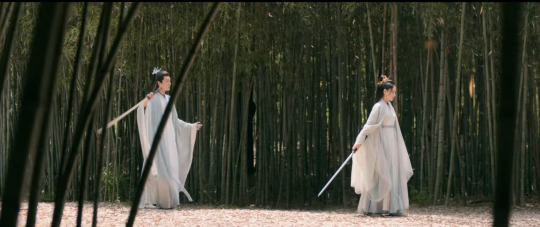
It might be double-edged or single-edged, I can't tell, but it has virtually no hand guard at all, not even a round one like a katana:
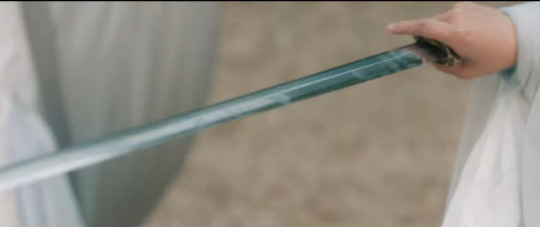
But when in a later scene Ronghao confesses, it is her own, true sword she drops, as a sign that things are getting simultaneously more magic and more real:
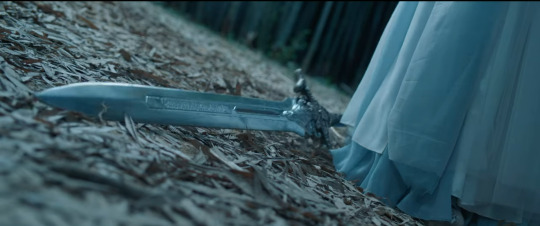
In Ep34, she uses it to kill some unfortunate pikemen:
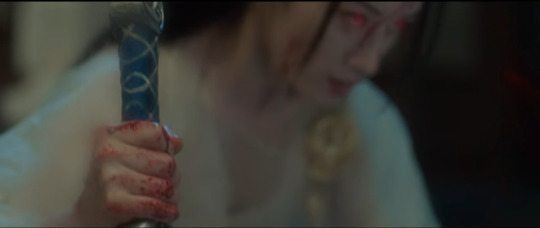
Meanwhile, back in Ep 16, Yannu's sword was the same plot-relevant shape, like Dongfang Qingcang's, and she holds it like a medieval warrior saint looking down from a Gothic arch:
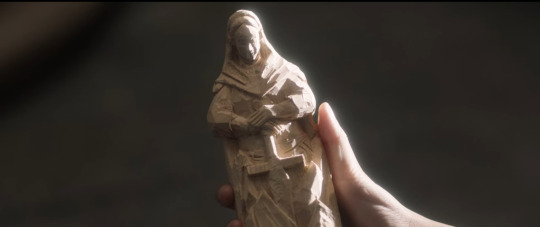
He held it the same way when Shangque greeted him in Episode 2.

Danyin's sword, when she manifests it, is in a rather modest and perhaps youthful style. Still straight and symmetrical, but with a very small, sharply hooked cross-guard:
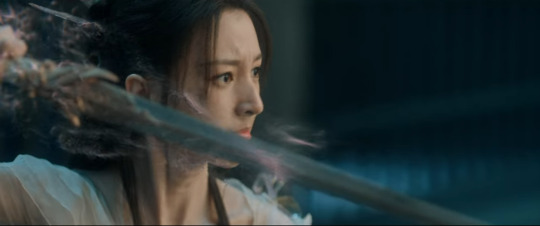
When Dieyi's whip-chain-flail-thing turns into a sword, it's even more European - it looks very like a rapier with a basket hilt! Kind of appropriate to her general look, actually, and her street-fighting personality.

When she changes stance we see this bonkers wiggly blade, which looks still rapier-ish (long, pointed, thrust more than cut), only insane. She doesn't use it like a rapier, though.

Ronghao's sword for killing is a curious design, still straight and with a pommel, but this curious sort of vestigial, bulbous thing that isn't really a guard of any kind. I don't know what's going on with this but the shape is a little bit like Theoden's sword in Return of the King. Not quite.
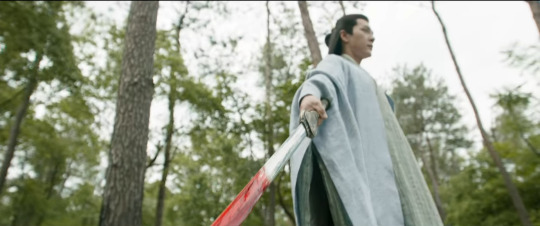
However, when Chidi eventually attacks him, they both use their simple sparring blades again:

Anyway! I was surprised to discover how nearly all of the swords used in this particular show visually followed styles I am familiar with both from western drama and from western historical collections, and none of them, except the ones in that last shot, looked at all like the most common styles of sword you see in Chinese dramas.
Obviously the weapons function exactly like the costumes in that they're primarily artistic visual references to various moods and ideas, rather than functional objects, but I think that makes this choice even more interesting. I don't know how usual it is for this genre, or what it means.
I haven't found where, if at all, we see Xunfeng or Shanque use a sword, and it's long past my bedtime so I'm stopping there.
#can lan jue#lbfad costumes#costumes and weapons meta#lbfad#love between fairy and devil#dongfang qingcang#rong hao#this is actually weird in a fascinating way#I don't think we ever see shangque use a sword
81 notes
·
View notes
Text

MORE Information about this beautiful book.
The book, to be published by Puffin, celebrates the 20th anniversary of the first in the Tiffany Aching series The Wee Free Men. This ultimate guide marks the first time Rhianna Pratchett has contributed to her father’s body of literary work for children.
Set in Terry Pratchett’s Discworld universe, Tiffany Aching’s Guide To Being A Witch is a must-have for any Pratchett fan with new illustrations from Terry’s ‘artist of choice’ Paul Kidby.
"An illustrated and practical guide to being a witch in Discworld, covering everything you’ve ever wanted to know from telling the bees to magical cheese, from dealing with elves to making deals with demons, from tending flocks to fending off forces from other worlds. This beautiful and practical guide has been compiled by Tiffany Aching herself, including snippets of remembered wisdom from Granny Aching alongside notes from Granny Weatherwax, Nanny Ogg, Miss Tick, and Rob Anybody who offer their own unique perspectives on all things witchcraft. Whether you’re a herbologist or a headologist, this book will inspire and empower new witches and seasoned practitioners alike."
Gabrielle Kent says: “I feel a part of me has lived on the Disc ever since a school-friend lent me my first Terry Pratchett book back in 1988. And when I discovered Granny Weatherwax and Esk in Equal Rites I knew that, in the witches, I had found my people. Back then I could never have dreamed that the girl who influenced Esk would become a huge part of my life and we would eventually go on to write a Discworld book together, discovering, in the process, that we both had shepherdess grandmothers. The Disc and its inhabitants mean so much to so very many people and, in this guide, Rhianna and I hope to have captured the essence and voices of the characters we have all grown to love as we explore what it means to be a witch in their world.”
Paul Kidby says: “I love all of Discworld but especially its natural world, the magic of the Ramtops, the energy of the chalk and its assorted local characters. The chance to illustrate this book filled with country witch lore and Nac Mac Feegles was an opportunity to good to be missed.”
Jane Griffiths, Puffin Publisher says: “Puffin is incredibly proud to be the home of Terry Pratchett’s incredible children’s books and we couldn’t be more thrilled to have such an exciting new piece of Discworld publishing for the 20th anniversary year of Tiffany Aching. Tiffany Aching’s Guide To Being A Witch, is going to be a must-have for Terry Pratchett fans everywhere as Rhianna and Gabrielle take readers to the heart of Discworld and uncover the secrets of what it really takes to be a witch in this incredible world, all brought to life by new full-colour illustrations from the amazingly talented Paul Kidby.”
It will be a hardback book with 192 pages and the indicators are a release date of 26th October 2023 published by Puffin books.
Price TBC
173 notes
·
View notes
Text
Former St. Louis Circuit Attorney Kimberly Gardner failed "to make her job as circuit attorney her top priority," according to a report.
Republican Missouri State Auditor Scott Fitzpatrick released a 71-page report on Tuesday, as well as a press release, that supported a previous statement of Gardner being the captain of a "rudderless ship of chaos" as she pursued a nurse practitioner certification during the hours she should have been doing her job.
The former Democratic prosecutor spent 34.5 working days, or about seven weeks, in the office during business hours working on her studies at Saint Louis University, the state auditor's office said in the statement.
"In my view, the driving force was Kim Gardner’s failure to make her job as circuit attorney her top priority," Fitzpatrick told the St. Louis Post-Dispatch.
His review also found widespread staff turnover, misuse of public funds and a significant drop in cases filed, referred and closed before Gardner resigned under fire in 2023.
Other issues cited in the audit include more than $58,000 in public funds spent on flowers, a disc jockey, car detailing, an office picnic, a chili cookout and Gardner's personal legal expenses.
Gardner told auditors that she was pursuing a family nurse practitioner post-master’s certificate "to improve the office and bring mental health awareness" to the office.
She was part of a movement of progressive prosecutors who sought diversion to mental health treatment or drug abuse treatment for low-level crimes, pledged to hold police more accountable and sought to free incarcerated people who were wrongfully convicted.
Republican leaders often criticized Gardner for a low homicide conviction rate, among other concerns. She frequently butted heads with police and conservatives.
"Our audit report paints a clear picture of an office that was far better off before Kim Gardner took over and has quickly rebounded after her departure. Despite her efforts to stand in the way of the audit process, we were able to obtain the information necessary to give taxpayers the full story on the damage she did to the office," Fitzpatrick said in a statement.
Backup link
7 notes
·
View notes
Text
Ways to use Dragons blood
Dragon's blood is a bright red resin obtained from various plant species, often used in traditional medicine and for various purposes. While it is not derived from actual dragons, it has been given that name due to its appearance.
Here are a few common uses of dragon's blood:
1. Incense: Dragon's blood can be burned as incense. Light a piece of resin and allow it to smolder on a heat-resistant surface, such as a charcoal disc or incense burner. It produces a fragrant smoke that is often used for rituals, meditation, or simply to create a pleasant ambiance.
2. Healing properties: Dragon's blood has been used in traditional medicine for its purported healing properties. It can be applied topically in the form of creams or ointments for various skin conditions, including wounds, cuts, rashes, and insect bites. However, it's important to note that the efficacy of dragon's blood for medicinal purposes has not been extensively studied.
3. Energy cleansing: Some people believe that dragon's blood has purifying and protective properties. It is used to cleanse spaces or objects by sprinkling a few drops of dragon's blood oil or by burning dragon's blood incense.
4. Rituals and spellwork: Dragon's blood has a long history of use in spiritual and magical practices. It is believed to enhance spellcasting, provide protection, and boost personal power. It can be incorporated into rituals, spells, and amulets according to the specific tradition or belief system.
It's important to keep in mind that the usage of dragon's blood varies across cultures and practices. If you are considering using it, it's best to research and consult with experienced practitioners or resources that align with your specific interests and beliefs.
#witchblr#witchcore#witchcraft#witchlife#white witch#beginner witch#witch tips#grimoire#spirituality#dragons blood#book of shadows
93 notes
·
View notes
Text
330: Clara Rockmore // Theremin
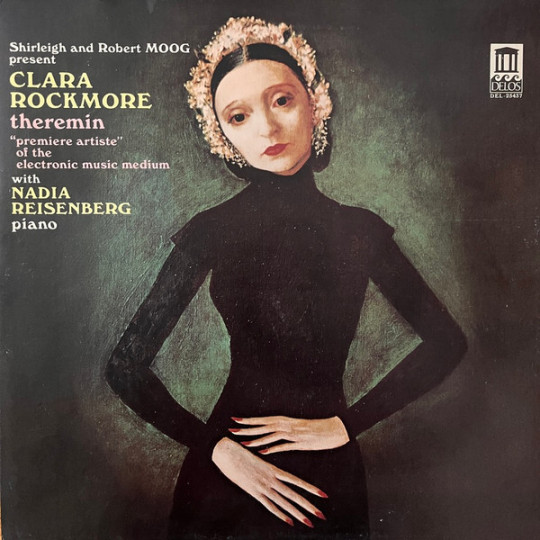
Theremin Clara Rockmore 1977, Delos (Bandcamp)
100 years since its invention, the theremin remains an oddity. It is in every respect an antiquated piece of technology, and yet like the Tesla coil and the plasma globe it still provokes the primal wonder of science-as-magic. The advancements of a modern synthesizer unit are hidden from the eye—if you presented it to an unthawed person from the 19th century, they would at least be able to infer that the device is controlled using the buttons and keys. But the theremin player creates sound by coaxing an invisible magnetic field with their bare hands, as though they are pulling its warbling voice from the air itself—and indeed, inventor Léon Theremin’s artful original name for his instrument was the ætherphone.
youtube
To watch a performance by Clara Rockmore, the instrument’s foremost practitioner, is to see something that resembles a scene from a séance or a German Expressionist film. A petite, dark-haired woman with the eyes of an Orthodox Virgin Mary, she would stand ramrod straight behind the lectern-like theremin, nearly motionless save for the almost palsied-looking convulsions of her knotted hands and the tensing of her eyebrows, the only sign on her otherwise slack features of the intensity of her concentration. She looks as though she is forcing down the song attempting to leap from her throat until it screams through her fingertips like steam from a kettle. As synth pioneer Robert Moog explains in his liner notes to Rockmore’s 1977 LP Theremin, her absolute stillness was not a theatrical device but a requirement of playing the instrument: the theremin’s magnetic field encompasses not only the performers hands but their entire upper body, meaning that even a minor motion of the head will influence the instrument’s pitch. But the austere figure she cut no doubt contributed to her allure, the sense that she was herself as unearthly as the instrument she played.
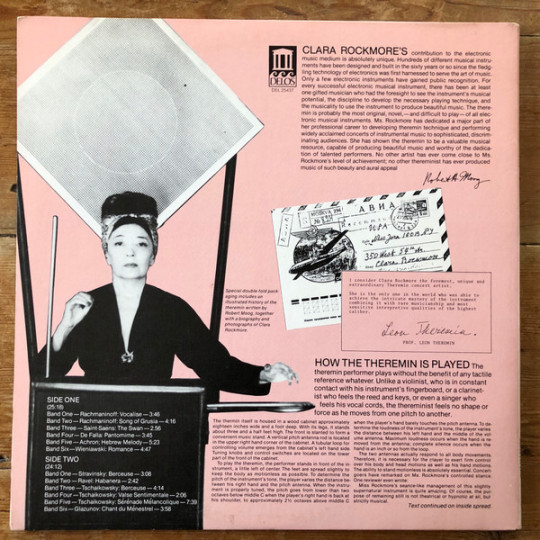
Rockmore, a violin prodigy since age 5, took to Theremin’s invention sometime in the late 1920s. Her concerts popularized and legitimated the instrument, but it would be nearly a half-century before the Theremin LP, her first, was finally released. Produced by Shirleigh Moog and engineered by her husband Robert, one gets the sense that the Moogs are fans trying to correct an oversight, to record the album as it would’ve sounded if it had been made her during her prime. The results are captivating, even haunting. At times you may be fooled into thinking you’re listening to a recording of a human soprano from some decayed shellac disc; in other moments, you will be moved by how world-weary an electronic tone can sound. Rockmore is accompanied, as she had been since the beginning, by her sister Nadia Reisenberg on piano, and her selections focus on 19th and early 20th century compositions, with a heavy emphasis on the Romantics. A majority of the pieces here come from her fellow Russians, including Tchaikovsky, Glazunov, Rachmaninoff, and Stravinsky. My personal favourite of these is her take on Joseph Achron’s “Hebrew Melody.” Inspired by traditional laments, Rockmore’s theremin evokes the sobbing characteristic (krekhts) of Jewish vocal music, while her sister thunders and pirouettes on her piano in a classically Romantic style.
Theremin stands apart from other electronic classical records like Wendy Carlos’ Switched-On Bach because it never sounds wholly like a novelty despite the theremin’s high camp potential (and, for that matter, Rockmore’s). It is peculiar, and my fascination with it definitely originated in a perverse nostalgia for esoteric junk—but the somber beauty of the sisters’ performance wiped the smirk from my face from virtually the moment I dropped the needle.
330/365
#clara rockmore#theremin#leon theremin#robert moog#moog#shirleigh moog#electronic music#early electronic#romantic music#'30s music#'70s music#classical music#nadia reisenberg#music review#vinyl record#mississippi records#joseph achron#tchaikovsky#rachmaninoff#glazunov#achron#stravinsky
12 notes
·
View notes
Text
Im finding more Brazilian pagans/witches and I’m loving it rn (UWAAA THEYRE SO COOL I WANNA BE FRIENDS WITH THEM)
any Brazilian practitioners of the craft interact with this post/comment so we can be friends !! :3
disc : krisdea_80483

#witchcraft#witchblr#witches#witch community#friends#brasil#brazil#paganism#paganblr#pagan community#hellenic pagan#pagan witch#wicca#pagan wicca#norse paganism
3 notes
·
View notes
Text
Certified DiSC Practitioners | Find DiSC Assessment Certification
We Facilitate-DiSC offers DiSC certification training courses online.They are diamond award-winning authorized partner dedicated to providing disc training.Visit their website for more information about disc certification courses.
#Disc Training#Disc Certification#Disc Assessment Certification#Disc Certified#Disc Training Certification#Disc Certification Wiley#Certified Disc Practitioner#disc consultant#disc personality certification
1 note
·
View note
Text
Cement mixer blues
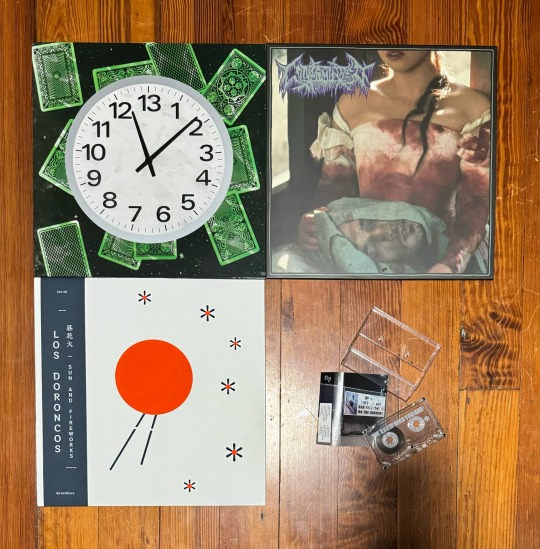
A couple more for your March, with Opening Day right around the corner. Four picks, all hits, and more waiting in the wings - but until then:
Thomas Bush, The Next 60 Years LP (Jolly Discs)
Album number three from Thomas Bush, one carving his own path through the history of quietly devastating British folk. That Bush has much to do with "folk" in general is debatable at this point, but there are fractured fragments within his damaged, precise compositions. On The Next 60 Years, he refines his vision further, not solely through reduction (though that, too) but with a bit of surprising bombast on the B-side. "Same Life Flowed" opens the album with plodding pop, the double-tracked vocals opening up just enough during the chorus to complement the harpsichord melody, and runs into the pensively dueling guitars on the accurately named "Pure Intention." As is Bush's wont, the album never keeps a straight course after this beautiful opening; some songs, like "Mulligan" or "Flood of Light," creak like floorboards in an empty house, whereas "Face In the Water" jumps out of the speakers from behind the curtain. I've never pieced together any influence of Talk Talk or Mark Hollis on Bush's sound, but now it's crystal on "Burn Clear," the patiently brushed cymbals and pattering drums pairing with slowly ringing chords, all directed by Bush's carefully delivered vocals. The samples on "Burn Clear" get turned inside-out on "Face In the Water," its booming synth chords leaving backwards bubbling loops in their wake, the distortion becoming ever more prominent as Bush's most clear, confident song unravels over its duration. The synth chords turn green midway through, and the garbled loops run rampant to cloud any pop ambitions with more unease. The album closes with the quietly devastating "Xtrails," a repeated descending progression of guitar notes and scattered synth chords, tying the album together neatly with only the necessary ingredients. In early listens, "Burn Clear" and "Face In the Water" were the highlights, but now tracks like "Thirsting" and "Xtrails" have become my favorites, the ones where Bush takes something recognizable and strips it to a skeleton and makes the bones vibrate with noise, creating a new story for the figure largely free from its past. Stunning, especially during my pre-dawn drives, but potent enough, and enveloping enough, to transport the listener from start to finish anytime. Sold out at the source, but I suspect copies will land stateside soon; if not, All Night Flight is handling the distribution - hop to it.
Contaminated, Celebratory Beheading LP (Blood Harvest)
Amidst a glut of ho-hum, self-referencing contemporary death metal, I wasn't really prepared for the complete onslaught that makes up Contaminated's second LP. I liked Final Man a lot, but things seem to have gotten a lot bleaker in the seven years since that came out, and Celebratory Beheading is the record that balls up collective agony into relentless, boneheaded death metal. It takes all of 15 seconds into opener "Suffer Minutiae" for the band to launch into a chugging breakdown riff, and even after multiple spins I feel as if I haven't captured the right words to describe music so single-mindedly brutish. There are no synths, electronics or really anything resembling a breather across the album. This new-look Contaminated feels like layers alternating between Carcass (pre-Heartwork) and Autopsy, with a dash of County Medical Examiners or other goregrind practitioner. Each song is made up of multiple movements, which is the stupid way my brain's been reduced to describing this record when it's on, but the very basic recipe is to pound with death metal crunch and follow it up with a grinding blast, before pulling back and taking another swing at your head. These parts are masterfully fused together without gaps or any recognizable structure, suffocatingly dense compositions coming one after another. Once your ears adjust, the pieces of the bulldozing sound can just barely be picked apart. The drummer's right up front with the vocals, and the two seem to goad each other on; the guitars, drenched in distortion and as beefy as I've heard (sans exterior electronic noise) in ages, churn out mercilessly hard or dizzyingly fast riffs. "Final Hours" is the point in the record where I finally catch my breath, and by "Apex C.H.U.D." (stands for Circular Headbanging Under Duress, pretty sure) you're stomping around like a sumo wrestler. Imagine running in a sewer tunnel away from a tidal wave of waste, each turn bringing no more distance or relief from the chase; at some point your legs and chest give out and you submit. I haven't looked at the included lyric sheet - the album and song titles are illustrative enough - but this seems to be the soundtrack to intentionally hammering a nail through your finger, pure visceral animal thrill, presented without concessions or interludes. My favorite record of the year so far.
Los Doroncos, Sun and Fireworks LP (An'archives)
There's nothing like the first whiff of springtime to bring me around to an album that made little sense during the dregs of the new year, and Los Doroncos' Sun and Fireworks is one for the ages. Seasoned vets with deep ties to the Japanese underground - members from Denudes, Maher Shalal Hash Baz, Doronco Gumo - but what you get here is a dream dive bar band, playing music both intimately familiar and somehow buoyant, not bogged down with expectations or concerned with much else than playin' hits. If the band set out to make classic rock feel fresh again, they nailed it, taking the scoff right outta my throat and using it to hit another solo. The band rips on the two longer tracks, "A minor" (one of the young year's best tracks) and "Drum," but elsewhere things are downright breezy. Guitars are largely unadorned until solos call for distortion, vocals are charming, paper-thin but hopeful, and the drums do enough to keep everything together. For me, any cynicism is eradicated by the beautifully disarming guitar lines littered about in "LuLu 2," but just as often it's the solo pushing its way through the clean chords of "Tin Ear." I'm in the midst of fixing up my porch, and if I get my way, I will be having a few beers back there with Sun and Fireworks elevating my mundane accomplishment. Come through.
Peg, We Know Who You Are and Everyone Is On the Lookout CS (No Rent)
Meeting of the minds between Cube's Adam Keith and Jackie-O Motherfucker's Dave Easlick, both of whom previously teamed up in SPF. I can't remember SPF's music much, though it may be time to revisit given how much I've enjoyed Peg's debut cassette. The music on We Know Who You Are feels like dub recorded without or presented without permission, as if found on a thrift store cassette, and then given added rhythm by Easlick and Keith's drumming and programming. "Mutual Percussion" is a sterling example, drums fading in and out while viscous treated guitar bubbles and the sound of a breeze or footsteps periodically emerge to confusingly give the feel of a field recording. The album feels sometimes ominous, sometimes sarcastic; the intention feels pure but you're never quite convinced with a track like "Agenda Jazz," either. Beyond sifting through the tape for intention, there's deep enjoyment here, skewering and distorting sounds in a way not unlike Equipment Pointed Ankh, though Peg's got a decidedly more abstract, glowering, smirking result. Hard to pick favorites, but if forced: the slouched strut of "Athletic Posturing"; the disarming "Everyone," all glistening synthesizer and distant drums; and my favorite, "Bog Standard," Easlick letting loose on the kit while a bassy loop and high-pitched noise build towers in the shifting sands. Really feels like these two met each other head-on this round, keeping stakes low for themselves but understanding one another intuitively to create one of last year's best albums.
#Thomas Bush#Jolly Discs#Contaminated#Blood Harvest Records#Los Doroncos#An'archives#Peg#No Rent Records
7 notes
·
View notes
Text
Pinched Nerve in The Spine: Radiculopathy - Symptoms, Causes, and Treatment
The spine consists of several individual bones known as vertebrae. These are interconnected together to form the spine. The spinal cord passes through a central canal in these vertebrae. From the spinal cord, the splitting of nerve roots occurs.
These roots travel between the bones of the spinal and different parts of the body. When the nerve root that leaves the spinal cord to other body parts becomes pinched, irritated, or damaged, it results in a medical condition known as radiculopathy. This condition is also known as a pinched nerve.

Types of Radiculopathy
Depending on where the condition happens in the spine, there are three types of radiculopathy. The symptoms of these types may range from mild to severe in individuals.
Cervical radiculopathy
Occurs due to pressure and compression of the nerve roots in the neck.
This portion of the spinal cord mainly affects the hands, arms, fingers, and shoulders.
Symptoms are usually visible in the hands and arms, which may include weakness or loss of sensation.
Lumbar radiculopathy
Occurs due to pressure and compression of the nerve roots in the lower back.
It may lead to sciatica, a condition that involves radiating pain in the sciatic nerve.
Thoracic radiculopathy
Occurs due to pressure and compression of the nerve roots in the upper back.
Chest pain is common in this condition.
There is a feeling of numbness and pain that moves to the front of the body in patients.
Causes of Radiculopathy and Risk Factors
Here are some of the commonly known causes of radiculopathy and the risk factors associated with it.
Change in size or shift in position of the tissues that surround the nerve root.
Herniated discs, also known as slip discs, are caused by to rupture of soft pads between spinal bones.
Bone spurs, bony outgrowths or projections resulting in constriction of the spinal passage. a condition in which the spaces within the spine get narrow.
Spondylosis is a wear and tear of the spinal disc with age.
Spondylolisthesis is a condition in which a vertebra slips out of its normal position onto the bone below it.
Spinal stenosis, narrowing of the spinal canal in the lower back.
Sciatica is pain travelling along with the sciatic nerve moving to the back of the thigh into the legs.
Thickening of spinal ligaments.
Spinal infections
Regular improper movements
Cancerous or non-cancerous growth in the spine
Radiculopathy Diagnosis
The diagnosis of radiculopathy begins with the patient giving a brief of their medical history to the doctor.
The doctor will ask questions about the type of symptoms, location of the pain, for how long has the pain been there, and also any other medical conditions which the patient is suffering from.
Once the medical history is known, the physician conducts a physical examination and tests.
This is to check the patient's muscular strength, reflexes, sensation, and also the possibility of any abnormalities.
Physical examination allows the medical practitioner to know the severity of the radiculopathy condition.
It also gives an idea about the location of the nerve root that is affected.
In some cases, radiculopathy diagnosis may require the use of advanced imaging techniques such as CT scan or MRI.
These tests aid in improving the visualization of the area where the problem lies.
In some cases, an expert like Dr Khanna orthopedic surgeon may also conduct a study on nerve conduction or Electromyography (EMG).
These tests help to know whether there is damage to the nerve or the problem is muscular.
Symptoms of Radiculopathy
The pinched nerve roots quickly become inflamed, which may result in the following symptoms:
Shooting pain in the back, legs, arms, and shoulders
Feeling of numbness and tingling sensation in the arms and legs.
Localized neck and back pain
Sharp pain when sitting idle or coughing
Sharp pain with movement
Hypersensitivity
Loss of sensation
Radiating pain in the shoulders
Skin numbness
Muscular weakness
Loss of reflexes
Sciatica
Non-surgical treatment for Radiculopathy
Conservative treatment is usually recommended before surgery. Here are some of the non-surgical treatment options for radiculopathy.
Physical therapy to strengthen the areas of pain.
Limitation or complete elimination of activities that cause radiculopathy pain and stains of the back and neck.
Immobilizing the affected area with
#Spine Care Specialists Indiana#Dr Khanna Orthopedic Surgeon#Orthopedic Spine Surgeon Munster#Minimally Invasive Lumbar Surgery Indiana#Neck Pain Treatment Munster#Best Spine Surgeon Indiana#Back Pain Treatment Munster#Osteoporosis Treatment Munster#Cervical Spondylotic Myelopathy Treatment#SI Joint Dysfunction Treatment#Sacroiliac Joint Dysfunction Treatment#Radiculopathy Treatment Munster#Spinal Stenosis Treatment Indiana#Lumbar Laminectomy Surgery Munster#Spondylolisthesis Treatment Munster#Spinal Cord Injuries Treatment Munster#Orthopedic Spine Specialist Indiana#Orthopedic Doctors in Munster Indiana#Best Orthopedic Doctors in Northwest Indiana#Back Pain Doctor in Northwest Indiana#Spine Treatment Indiana#Orthopedic Surgeon in Munster#Spine Doctors Indianapolis#Spine Surgery Indianapolis#Pain Management Munster Indiana#Cervical Disc Replacement Near Me#Cervical Disk Replacement Surgery#Minimally Invasive Surgery Indiana
2 notes
·
View notes
Text
Tzuran
Tzuran, the enigmatic creed embraced by a significant portion of the Tru-isil Empire's populace, particularly the elite, is a religion steeped in fatalism and detachment. It's a faith that, through its doctrines, subtly endorses a libertine lifestyle, providing the morally ambiguous nobility of the Tru-isil Empire with a divine justification for their often deplorable actions.
The central tenet of Tzuran posits that the universe was birthed from the ennui of Tzura LuAvramah, a deity who, weary from contemplating his own flawlessness, crafted existence as a diversion. He envisioned the cosmos as a silver disc, spinning it into motion to observe the unfolding saga of divine and mortal beings—a spectacle designed to stave off his eternal boredom. Tragically, all entities within this cosmic disc are ensnared in a relentless cycle of existence, doomed to repeat their roles ad infinitum for the amusement of Tzura LuAvramah.
Yet, Tzuran offers a sliver of hope: the possibility of liberation from this ceaseless cycle. A select few may seize the chance to break free, to become sovereigns of their own realities. This path to emancipation demands profound self-awareness and the recognition of the illusory nature of the material world. While Tzuran advocates for experiential learning through ritual and the teachings of past sages, in practice, this often translates into hedonistic pursuits under the guise of spiritual enlightenment.
Tzuran's moral framework is nebulous at best, providing broad principles aimed at preserving societal order rather than dictating personal conduct. This lack of ethical rigidity, especially prevalent among the affluent, does little to curb the misuse of power or offer solace to those in lesser circumstances. The priesthood's ambiguous stance further exacerbates this issue, failing to hold the powerful accountable or provide a beacon of hope for the downtrodden.
In the worldview of Tzuran, gods and supernatural beings are seen as equals to mortals, often less cognizant of their plight due to their perceived superiority. These entities are not objects of worship but rather partners in negotiation or sources of arcane knowledge. Reverence is eschewed in favor of pragmatic interactions with these higher beings.
The religion of Tzuran, as observed by Lu-zan Gao, an envoy from the Tauxien Empire, is not one that fosters virtues like compassion or wisdom. Instead, it champions self-indulgence, a trait already all too common among the Tru-isil Empire's corrupt nobility. Gao's experiences with the Tzuran practitioners left him with a sense of disdain, as he witnessed rituals that seemed to mock their creator in a manner he deemed sacrilegious. His reflections underscore the complex and often contentious relationship between faith and morality within the Tru-isil Empire.
#conworld#worldbuilding#low fantasy#world building#arkera#creative writing#dark fantasy#fantasy world
6 notes
·
View notes
Video
youtube
Spleen - "That Was My Head" Darque Fonque 1997 Illbient / Trip Hop
Plays: 1.4K+ on YouTube
Although his biggest successes have come via his partnership with UK alt-indie darling PJ Harvey as her producer, Bristol native Rob Ellis has also headed up a nebulous side project called Spleen, which was less of a band and more of a large collective. In their roughly ten years of work, Spleen managed to release a total of three albums and three singles, and PJ Harvey herself is considered to have been a member of the project.
The thing about Spleen though is that every single song in their catalog was made by an assortment of different people, meaning no song has the same exact lineup. And I guess that's what led to their sound being classified as a whole bunch of different things, from stoner rock, to art rock, to jazz-rock, to avant garde, to ambient, to experimental rock. But with this track that originated from their first 12-inch, 1996's Like a Watermelon, they appear to add illbient trip hop to that varied list of genres.
Illbient, for those that don't know, is this very eerie, unsettling, dark, and off-kilter form of instrumental hip hop or trip hop. Its foremost practitioner is a very talented guy who goes by the name of DJ Spooky (naturally), and he was part of this tight-knit scene that formed in Williamsburg, Brooklyn in the mid-90s. Illbient's biggest label, WordSound, is also responsible for releasing top-notch hip hop producer Prince Paul's long-awaited debut album, Psychoanalysis: What Is It?, in 1997, which got into some hip hop experimentalism as well.
Anyway, that Brooklyn-made illbient sound appears to have also seeped its way across the pond, as the duo of Techno Animal—Godflesh lead singer and former Napalm Death drummer Justin Broadrick and his constant collaborator Kevin Martin, aka The Bug—brought it forth in 1995 with a lengthy double-disc called Re-Entry, which was released on Virgin. Then the following year, Spleen went in a similar direction with a song called "That Was My Head," which first appeared on the Like a Watermelon 12-inch, and was then included on Middle Earth Recordings' Darque Fonque compilation in 1997.
But there's actually a common thread here between Spleen and Techno Animal: a drummer from Chicago named Lou Ciccotelli, who's played in some UK bands, including one called God, which also claimed the two guys from Techno Animal as its members. And Ciccotelli is also credited with co-writing this Spleen song with Rob Ellis, so maybe he's the one who brought the Techno Animal-God sound along with him to make this tune? Most other Spleen tracks don't sound like this one 🤔.
The overall eeriness of this over-eight-minute song comes through immediately, sounding like some kind of anxiety-inducing horror film score, with strewn-about, disconcerting sax phrases laid over ominous strings. But it's not until about 70 seconds in when this thing really starts to take shape and adopts its illbient sound, with what I'm guessing is Ciccotelli's contribution: a killer, booming drum track. Now, almost every drum track—whether it be hip hop, trip hop, or illbient—is made with either a drum machine or some kind of software. But there's a certain crispness, clarity, and depth to a live recorded drum track that you just can't replicate with any kind of electronics, and I think Ciccotelli's playing on this tune proves my point here.
Once it enters, Ciccotelli's beat holds steady, which then allows Ellis to get all this pent-up experimental avantgardism out of his system. He starts with the sax, gets to keys and an organ, and then he starts unveiling sounds that leave me scratching my head as to what he even used to create them ⁉ Maybe he literally banged his noggin on some things and that's why this song is called what it is?
Me: "Okay, so what did you use to make *this* sound?”
Rob Ellis: "Yeah, that was my head"
Me: 😮
Either way, I tend not to vibe much towards illbient, because a lot of it's just too weird and cold for my tastes, but Ciccotelli's live drums here are too nice for me to ignore, and it allows me the opportunity to get out of my comfort zone and experience whatever the hell it is that PJ Harvey's producer is conjuring up behind him.
Spleen was really ~something else~.
By the way, another terrific trip hop track that uses live drums is Red Snapper's original demo of "4 Dead Monks," which appears on Warp Records' We Are Reasonable People compilation. Check it out if you dig this too 👍.
18 notes
·
View notes
Text
Raleigh’s LIE HEAVY Bring Heavy Rock Vets Together for New Music Video
~Doomed & Stoned Debuts~
By Billy Goate

LIE HEAVY burst on the scene last year, self-releasing their debut full-length, but the album did the rounds quickly and landed on the Doom Charts radar. In July, they debuted in the top 40 with 'Burn To The Moon' (2023) and have only conquered more ear-drums since that time.
Veteran musicians are drawn from The Skull, Confessor, and Legions of Doom, and believe me they bring everything to the table: sweet southern stoner riffs (Graham Fry on guitar), a stout rhythm section (Jeff JD Dennis on drums, TR Gwynne on bass), and singing that really gets your attention (Karl Agell on vox).
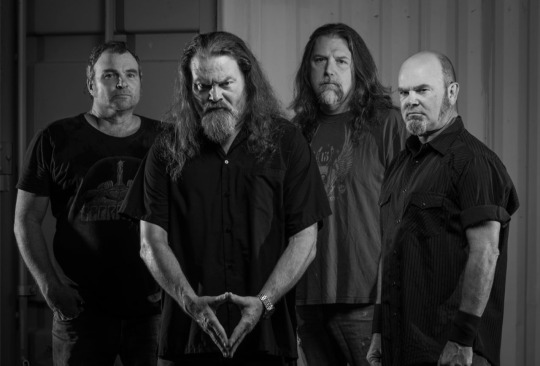
Vocals really distinguish the band's titular song, both the verses and the chorus, as to be expected from the former singer for Corrosion of Conformity ('89-'93), who's since also fronted Blind, Leadfoot, King Hitter, and Legions of Doom, among others. There's a commanding expressiveness to the lyrics that just makes you a believer. Take one look at the crazed stare in Karl Agell's eyes and you'll get a sense that this guy is in this heavy rock thing lock, stock, and smoking barrels.
This song has it all, and a positive message to boot ("Your heart can heal your mind, your mind can heal your heart"). There's also some wicked, soulful soloing towards the end, not to be missed.
Today, Doomed & Stoned brings you the world premiere of the music video for "Lie Heavy," where the band balances their heaviness with plenty of self-effacing humor.
Look for Lie Heavy's Burn To The Moon, releasing via Heavy Psych Sounds on three varieties of vinyl, compact disc, and digital format on April 19th (pre-order here).
Give ear...
youtube
SOME BUZZ
Raleigh, North Carolina's Lie Heavy is one of the few, true throwbacks to another era. They feature the vocals of Karl Agell, best known for Corrosion of Conformity's BLiND album and Leadfoot. Heavy, heavy-ass blues that would have fit on the Man's Ruin label back in the 90s, around the time that Orange Goblin was making waves. This is primal stuff: not quite Stoner, not quite Metal, and not quite giving a shit.
LIE HEAVY - Burn To The Moon by HEAVY PSYCH SOUNDS Records
Lie Heavy draws on the original hard 'n groovy jams of Sabbath, Mountain, Lizzy and Purple, fused with their own massive experience. So, it is not difficult to fathom why Lie Heavy sounds like a well-oiled, hard working band of 30 years rather than a new entity. Their pedigree does not belie their power. Collectively, they have spent tens of thousands of hours in practice spaces, studios and on stages around the world, honing their vast skills, to find one another in this moment being among the top guardian practitioners at the gates of transcendently heavy music.

Follow The Band
Get Their Music
#D&S Debuts#Lie Heavy#Raleigh#North Carolina#stoner metal#heavy rock#Corrosion of Conformity#music video#Heavy Psych Sounds#D&S Reviews#Doomed and Stoned
2 notes
·
View notes